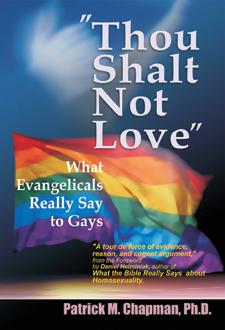As a young gay Christian, Patrick Chapman was deeply conflicted about his sexual orientation. “I grew up believing that God condemns gays to hell,” he explains.
Without any role models to help him learn how to deal with his homosexuality, Chapman felt isolated and alone.
In high school, Chapman was terrified that his attraction to men would become apparent and he became preoccupied with avoiding showers after gym class. While in college, he was advised by his pastor to keep his sexual inclinations hidden.
Yet dating girls filled him with guilt, as he realized he was using these women in an attempt to change his sexuality.
All that changed when Chapman came across an article on homosexuality while researching his PhD. “I realized that what I had been told in therapy and by religious leaders was wrong: biological research suggests homosexuality is an inborn characteristic that cannot be changed and is common throughout the animal kingdom,” says Chapman.
“I remember thinking at the time that this goes against what evangelical Christians said. It made me realize that maybe what they were saying wasn’t actually correct.”
Chapman’s new book Thou Shalt Not Love: What Evangelicals Really Say to Gays offers an anthropological critique of the arguments evangelical Christians commonly use against homosexuals and same-sex marriage.
In it he confronts the typical evangelical argument that society’s acceptance of homosexuality will directly or indirectly destroy the United States. (Many evangelicals claim, for example, that the Sep 11 terrorist attacks were an act of punishment from God.)
He begins by challenging the assertion that the Bible condemns homosexuality. Upon careful examination, he concludes there is no condemnation of homosexuality in the Old Testament. While three New Testament passages supposedly condemn homosexuality, Chapman explains that these texts are difficult to translate.
“Taking the Bible at face value is unwise,” he says, explaining that the Bible needs to be looked at through historical, scriptural, and cultural contexts.
“The gay community needs to learn how to speak the language of evangelical Christians and be able to respond to their arguments directly,” he argues. “Right now, the gay community is very ill-equipped to be able to speak the language and understand where evangelicals are coming from.
“Until we understand where they are coming from, we can never accurately, or adequately respond to them,” he adds.
He points, for example, to Proposition 8, the California ballot initiative that recently rolled back gay marriage rights in that state.
The 43-year-old Puget Sound resident believes there were lots of evangelical statements that went unchallenged in the Prop 8 debate. “We just don’t have the background knowledge to point out those are lies,” he says.
Case in point: the claim commonly made by evangelical leaders that same-sex marriage is new. Just the other day, Chapman says he watched former Republican presidential candidate Mike Huckabee claim on The Daily Show with Jon Stewart that for the last 5,000 years marriage has been between one man and one woman.
“This is simply false,” says Chapman. “Same-sex marriage has been around since we’ve had written records.”
In his book, Chapman debates the definition of marriage with Glen T Stanton, co-author of Marriage on Trial and director of Family Formation Studies at Focus on the Family. Stanton views marriage as a sacred lifelong union ordained by God to be between a man and a woman for the purpose of creating a stable family.
“The forms marriages take are varied, ranging from monogamous to polygamous from same-sex to opposite sex,” Chapman counters.
Chapman’s own path to self-acceptance has been a long and difficult one. He spent a decade of his life attending an “ex-gay” ministry in a futile attempt to shed his same-sex lust and go straight.
“The drive to change my sexual orientation was largely for religious reasons,” he explains. “I grew up believing that God condemns gays to hell. Being very religious at the time, I didn’t want to go to hell.”
Meanwhile, he says, he heard from religious leaders like Focus on the Family’s James Dobson that “you can change your sexual orientation, that it wasn’t something that you were born with, that it was because of your upbringing.”
Chapman thought it was worth a try.
His failure to become “ex-gay” gave him the impression that God was rejecting him, he says. He remembers feeling depressed and defeated.
“I knew that I was someone who truly wanted to change and nothing was changing. Even though people were telling me I didn’t want it hard enough, I knew it simply wasn’t true.”
When Chapman finally realized that he had been misled by his evangelical leaders and that he couldn’t change his sexuality, he accepted it. Eight years ago, he came out to his parents and siblings.
Chapman abandoned the literal approach of the Bible and adopted CS Lewis’ approach in Reflections on the Psalms that the Bible’s message lies in its overall tone and temper, and should not be read as an encyclopedia.
Interestingly, Chapman feels anti-gay preacher Fred Phelps of the Westboro Baptist Church &madsh;who does take the Bible at face value, believes homosexuals will burn in hell for eternity and pickets plays such as The Laramie Project &madsh;”does more for gay rights than many other people do.”
“It highlights how irrational the opposition to homosexuality really is,” Chapman says. “I cannot help but think that each time his group protests, people end up becoming more sympathetic to the LGBT community and what we face on a daily basis.”
THOU SHALT NOT LOVE: WHAT EVANGELICALS REALLY SAYS TO GAYS.
Patrick Chapman.
Haiduk Press, $19.

 Why you can trust Xtra
Why you can trust Xtra


